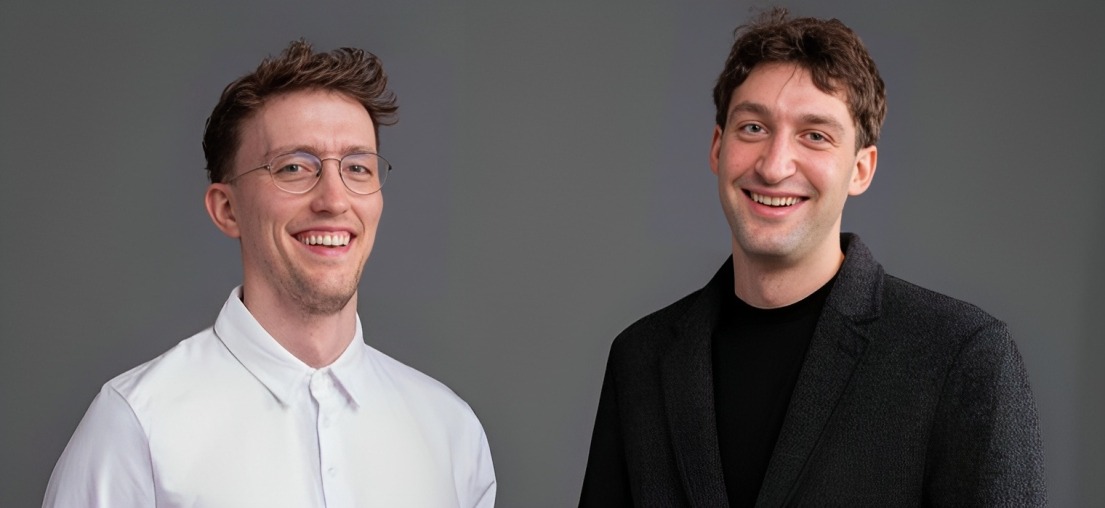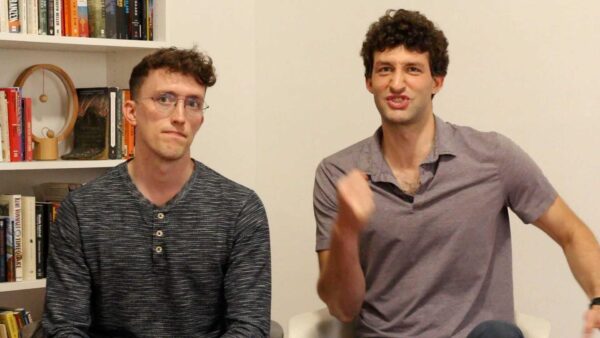Sam’s UpBeing Story
Q: Can you briefly describe yourself and your startup?
A: I’m Sam, the CEO and co-founder of UpBeing. My background is in general business, having worked at B2B SaaS companies, ultimately becoming the VP of Operations for a 95-person post-series A company. I joined Entrepreneurs First to pursue my ambition of starting my own venture. While I had the skills for a business side co-founder role, I lacked concrete ideas and a technical co-founder. Entrepreneurs First was a great fit for me in that regard.
As for UpBeing, we’re a behavioral health tech company focused on bridging the gap between humans and computers, specifically artificial intelligence and emotional intelligence. We create intellectual property around behavioral data, particularly how it relates to emotions. . Our IP has the potential to revolutionize how we value things in today’s world by introducing emotional sentiment as a metric.
Our direct-to-consumer application helps individuals understand the connection between their behaviours and emotions and trains our underlying models. This passive approach to measuring well-being extends support to one’s family, clinicians, mental health coaches, and AI coaches, empowering the entire support network to improve their well-being.
Entrepreneurs First Application Process
Q: Can you briefly describe the application process of the accelerator?
A: The application process for Entrepreneurs First (EF) can be dynamic and may change over time. When I went through it, it involved several stages. Initially, there was a written application. After that, there was a series of interviews and meetings with both the founder team and the support team in Toronto.
The interviews covered various aspects. There was a behavioral interview, which aimed to understand the candidate’s behavior and attitudes. Additionally, there was an interview focused on why you would make a good founder, assessing skill sets. There was also an interview to gauge the candidate’s thinking process and what they believed makes a successful founder.
EF looked for different components in a founder during these interviews. So, there was an experiential interview and a behavioral interview, along with the previously mentioned skill set and thinking-oriented interviews.
The program itself is competitive, and not everyone makes it to the end. Opportunities to exit the program can arise during the process, such as if you haven’t matched with a co-founder after eight weeks or if you find that the matching process isn’t the right fit for you. The program felt like an extended application process leading up to graduation and securing actual funding.
What EF is Like
Q: How is a typical day within the accelerator after you get accepted?
A: A typical day in the accelerator can vary depending on your progress. If you’re in the process of matching with a co-founder, EF encourages you to meet and interview various other founders. They provide templates and processes for this. During these meetings, you discuss your skills, strengths, and areas of expertise. The goal is to find a co-founder whose strengths complement yours and align with your interests and problem-solving passions.
These meetings also involve discussing thematic areas of interest and the problems you’re passionate about solving. You assess whether you and your potential co-founder have the skillset to validate these problems and start solving them together. In this phase, you might go through several meetings with different co-founders, as EF encourages quick breakups if the partnership isn’t working out.
Once you’ve found a co-founder and are working on a specific idea, your focus shifts to problem validation. You work on understanding whether the problem you’re addressing is valid and whether there’s a market for your solution. Activities like building, running tests, and exploring the market become central to your work.
The activities you engage in during the accelerator program depend on where you are in your journey of building a startup. EF provides templates and guidance on its website to help founders navigate each stage of the process.
Q: Did you also have access to mentors and if yes, how much hands-on support did you get?
A: Yeah, we had loads of access to mentors. As soon as you match, you’re paired with one. They’re gold in helping you figure out if you’re right for each other and guiding you in problem validation and showing initial traction. Beyond that, there’s the EF network. This means you can chat with past founders, pull insights from alumni, or even tap into your personal network. And let’s not forget about the EF support team – different from mentors, but oh-so-valuable for connecting and guiding. Post-program? There’s still some less structured access, but the Slack network remains, offering continued support.
Q: How much funding did you get from the program?
A: We received funding on a safe note upon graduating. Things might’ve shifted since, but back in my day, it was 100k on the initial safe note. It’s not exactly equity; it’s through a safe vehicle, which is like a convertible vehicle for equity. There’s a cap on it, which sits at a million bucks. If you’re not familiar with what a safe is, I’d suggest checking it out.
Q: Can you share a significant milestone that you achieved during the program?
A: A big win for us was snagging investment and wrapping up the program. It felt like a pat on the back. But more than that, crafting our first MVP, proving we could make it, and realizing we were onto a real problem was a thrill. Validating our approach, especially when comparing other paths like B2B or B2G, was huge. The cherry on top was getting that nod of approval at graduation.
Post-Program Progress
Q: What’s the status of the company today? What have you achieved so far post-program?
A: So after the program, we successfully raised a pre-seed round in June of 2022. We took that momentum to finalize the production version of our product, which we’re eager to launch next month. In parallel, we’ve forged research partnerships and welcomed thousands of users to our platform.
Seeing our efforts genuinely improve people’s well-being has been incredibly rewarding. The growth of our team, from the first hire to the tenth, has been another highlight. We’ve even garnered government support and kicked off pilot projects with diverse communities. Investment-wise, securing our last funding round was a significant accomplishment, and launching our product to the public soon will be our next big step.
Advice for Founders Considering Accelerators
Q: Do you have any final advice that you want to give to founders who are thinking of applying to Entrepreneurs First or a similar accelerator?
A: Yeah, it’s a fantastic way to see if you’re cut out for the founder role. For both newbies and those who’ve started businesses before, it’s an excellent refresher and networking opportunity. I see it as ideal for eager first-timers, ready to dive deep, and not just dabble. The support and compensation you get are top-notch.
My suggestion is if you’re considering a founder’s journey, join EF. Approach it with an open mind. Aim high. Strive to create something groundbreaking, something that can change the world. And always focus on solving significant challenges. That’s the key.


